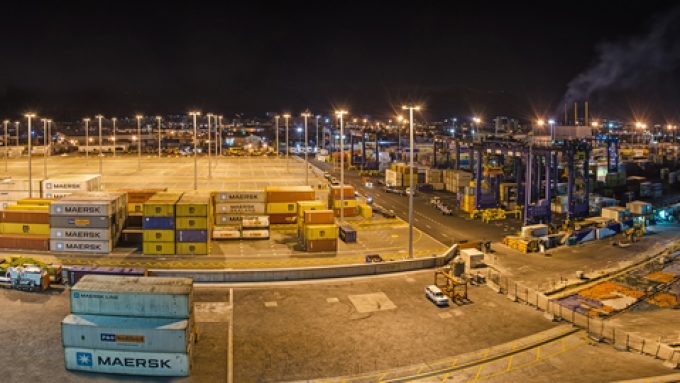Liners add capacity to Asia-ECSA as ocean rates hit 18-month high
With Asia-South America ocean freight rates at an 18-month high of around $4,350 per 40ft, ...

The fragility of South Africa’s container supply chains was again in evidence after Cyclone Belal, which swept across the Indian Ocean in January, severely disrupted operations in the Mauritius transhipment hub of Port Louis.
It exposed the vulnerability of being dependent on a transhipment terminal in a third country.
Carriers’ frustration at delays in South Africa’s main gateways of Durban and Cape Town have led to series of service adjustments, the most prominent of which was the decision by Maersk to drop a direct call at Cape Town on its FEW6 Asia-south/west Africa service and replace it with a new feeder service, the Cape Town Express, between Port Louis and Cape Town.
At Port Louis, exports out of Cape Town destined for Asia – South-east Asia is the second-largest region for South African fruit exports, for example, after Europe – were to be transhipped onto vessels in the Safari service Maersk operates in conjunction with CMA CGM and Cosco.
However, last week Maersk revealed it would have to skip the eastbound Safari call at Port Louis with the next vessel due, the 8,700 teu San Felipe.
“Due to the extreme productivity challenges in Durban as well as delays in Port Louis due to the recent cyclone impact, maintaining the current eastbound call into Port Louis on San Felipe is no longer feasible,” the carrier told customers.
“San Felipe will omit Port Louis and sail straight from Durban to the Far East to ensure it is on time for the next rotation back into Southern Africa.
“CPT [Cape Town] exports discharged in Port Louis from the Cape Town Express vessels will now be loaded on the Mendelssohn which will induce into Port Louis following its rotation through Mozambique.”
The 3,650 teu Mendelssohn is deployed on the M-Express Asia-East Africa service jointly operated with CMA CGM.
Maersk added that it was reviewing upcoming Safari vessel schedules and how to maintain its coverage for Cape Town shippers’ cargo to the Far East.
After Cyclone Belal hit Mauritius in late January, Maersk stopped taking new bookings on the Cape Town Express and asked shippers to delay and stagger Asia-bound shipments, to “allow us to circumnavigate these challenges”.
According to the eeSea liner database, in mid-November when the December launch of the Cape Town express service was announced, congestion at Port Louis was at just 10%, while Durban was at 64% and Cape Town at 29%. (Chart below, click to expand)
However, in the ensuing weeks, congestion levels steadily rose at Port Louis to reach 76% shortly before Christmas, three weeks after the Cape Town Express began sailing. Whether this was caused by the introduction of the new service remains unclear, but it is instructive that congestion levels at Cape Town dropped to 10% at the beginning of December, where they remained until growing to 38% at the turn of the year.
The data also shows the impact of Cyclone Belal, and Port Louis saw 90% congestion levels by week four of this year. Currently, congestion at Durban is at 42%, Port Louis at 40% and Cape Town down to 22%.
Comment on this article